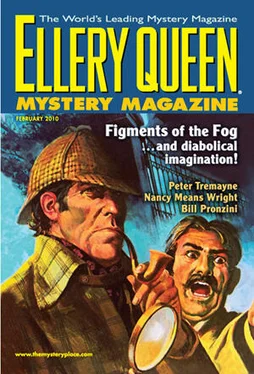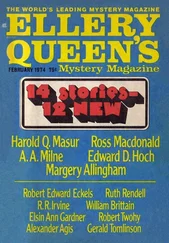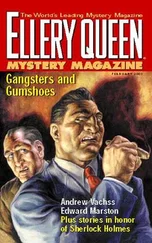Robert Barnard - Ellery Queen’s Mystery Magazine. Vol. 135, No. 2. Whole No. 822, February 2010
Здесь есть возможность читать онлайн «Robert Barnard - Ellery Queen’s Mystery Magazine. Vol. 135, No. 2. Whole No. 822, February 2010» весь текст электронной книги совершенно бесплатно (целиком полную версию без сокращений). В некоторых случаях можно слушать аудио, скачать через торрент в формате fb2 и присутствует краткое содержание. Город: New York, Год выпуска: 2010, Издательство: Dell Magazines, Жанр: Детектив, на английском языке. Описание произведения, (предисловие) а так же отзывы посетителей доступны на портале библиотеки ЛибКат.
- Название:Ellery Queen’s Mystery Magazine. Vol. 135, No. 2. Whole No. 822, February 2010
- Автор:
- Издательство:Dell Magazines
- Жанр:
- Год:2010
- Город:New York
- ISBN:нет данных
- Рейтинг книги:3 / 5. Голосов: 1
-
Избранное:Добавить в избранное
- Отзывы:
-
Ваша оценка:
- 60
- 1
- 2
- 3
- 4
- 5
Ellery Queen’s Mystery Magazine. Vol. 135, No. 2. Whole No. 822, February 2010: краткое содержание, описание и аннотация
Предлагаем к чтению аннотацию, описание, краткое содержание или предисловие (зависит от того, что написал сам автор книги «Ellery Queen’s Mystery Magazine. Vol. 135, No. 2. Whole No. 822, February 2010»). Если вы не нашли необходимую информацию о книге — напишите в комментариях, мы постараемся отыскать её.
Ellery Queen’s Mystery Magazine. Vol. 135, No. 2. Whole No. 822, February 2010 — читать онлайн бесплатно полную книгу (весь текст) целиком
Ниже представлен текст книги, разбитый по страницам. Система сохранения места последней прочитанной страницы, позволяет с удобством читать онлайн бесплатно книгу «Ellery Queen’s Mystery Magazine. Vol. 135, No. 2. Whole No. 822, February 2010», без необходимости каждый раз заново искать на чём Вы остановились. Поставьте закладку, и сможете в любой момент перейти на страницу, на которой закончили чтение.
Интервал:
Закладка:
When he’d seen enough, he walked at a leisurely pace back to Main Street. The stone-housed general store near the hotel, Swerer’s by name, was still open for business. Inside, as he paid for his purchases, the garrulous young fellow behind the counter took considerable pride in informing him that the writer Bret Harte had once clerked there. Quincannon was more impressed by the outlandish prices charged for one dark lantern, one small tin of lamp oil, and a plug of Navy Cut tobacco. Not that the outlay bothered him; the amounts would be added to the expense account he would present to the Sierra Railway Company along with his bill for services rendered.
Hunger prodded him into Miner’s Rest Cafe, where he ate a bowl of mulligan stew and sampled a Mother Lode country favorite, a pie made with vinegar and raisins. The dessert turned out to be more appetizing than its name, fly pie.
Once more in his room at Cremer House, he stripped to his long johns and again made an effort to settle himself on the mound of bricks. He set his internal clock, a mechanism so unfailing that he never used one of the alarm variety. He was asleep within minutes.
At three a.m. Quincannon slipped out of the hotel’s side entrance carrying the dark lantern, its wick already lit and the shutter tightly closed. Main Street was all but deserted at this hour; even the saloons had closed. He avoided the one man he saw, a lurcher under the influence, and in less than ten minutes he was hurrying through the deep shadows on Icehouse Road.
No lamplight showed now in the shedlike office next to the icehouse. Darkness shrouded building and outbuildings alike, as well as the road in both directions. Quincannon paused under one of the trees to listen. A night bird’s cry, a faint sound from the direction of the corral that was likely the restless movement of a horse. Otherwise, silence.
He picked his way through dew-wet grass to the rear of the icehouse. As he’d expected, the pair of heavy wooden entrance doors were locked. He opened the lantern’s shutter a crack, shielding the light with his body, and quickly examined the iron hasp and padlock. Well and good. The padlock was large and looked new, but it was of inferior manufacture.
He closed the shutter, set the lantern down. The set of lock picks he carried, an unintentional gift from a burglar he’d once snaffled, were the best money could buy, and over the years he had learned how to manipulate them as dexterously as any housebreaker. The absence of light hampered his efforts here; it took him three times longer, working by feel, than it would have under normal circumstances to free the padlock’s staple. Not a sound disturbed the stillness the entire time.
He removed the lock, hung it from the hasp, and opened one door half just wide enough to ease his body through. The temperature inside was several degrees colder. When he opened the lantern, he saw that he was in a narrow space that sloped downward and was blocked on the inner side by a second set of doors. These, fortunately, were not locked.
The interior of the icehouse was colder still, as frigid as a politician’s heart. Quincannon put on the gloves he’d brought with him, then widened the lantern’s eye to its fullest and shined the light around. The stone walls, he judged, were at least two feet thick and the wooden floor set six feet or so below ground level. Large and small blocks of ice lined both walls, cut from the creek or hauled from the Stanislaus River during the winter months. Thick layers of straw covered the floor and was packed around the ice; the low ceiling would likewise be insulated with straw to keep the sun’s heat from penetrating. A trap door in the middle of the floor would doubtless give access to a stone- or brick-walled pit that would also be ice-filled, a solid mass ready to be broken by axe and chisel into smaller chunks as needed.
He played the light around more slowly, looking for a likely hiding place. None presented itself. The cold had begun to penetrate his clothing; he hurried to the far end and began his search, stamping his feet to maintain circulation.
By the time he had covered three-quarters of the space, finding nothing but ice and straw, he was chilled to the marrow. But his high good humor remained intact; so did his confidence. The stolen gold was hidden somewhere in here. Logic dictated that it couldn’t be anywhere else.
Five minutes later, his faith in himself and his deductions was rewarded.
At one wall not far from the entrance, he uncovered a cavelike space formed by ice blocks and a thick pile of straw. The bullion and sacks of dust were piled under the straw — the entire booty, from the look of it.
A satisfied smile creased his pirate’s beard. He pocketed one of the sacks, heaped straw over the rest of the gold. Quickly, then, he made his exit, making sure before he stepped outside that the night was still untenanted. He replaced the padlock without closing the staple, then hastened back into town to locate Constable Teague.
Shortly past dawn, in C.W. Cromarty’s private car, Quincannon prepared to hold court.
He and Teague, accompanied by a group of deputized citizens that included the express agent, Booker, had taken the Schneider brothers by surprise at their cabin and arrested them without incident. The two thieves were now ensconced in the Tuttletown jail. The gold had been removed from the icehouse and turned over to Booker for safekeeping. With Teague in tow, Quincannon had then come here to tell the superintendent and his chief engineer the good news.
Cromarty was effusive in his praise. “Splendid, Mr. Quincannon,” he said. “Bully! And the job done in less than twenty-four hours. You’re something of a wizard, I must say.”
“I prefer the term artiste,” Quincannon said. Humility was not one of his virtues, if in fact it was a virtue. Why shouldn’t a man at the zenith of his profession be boastful of the fact? “You might say that I am the Rembrandt of crime solvers.”
Teague said, “Who’s Rembrandt?” but no one answered him.
“Tell us how you deduced the identity of the thieves and the location of the gold,” Newell urged.
“And how they got the safe open.” The constable appealed to the two railroad men. “He wouldn’t tell me before, just said he’d explain everything when we come here.”
Quincannon took his time loading and lighting his briar, drawing out the moment. This was the time he liked best, the explanations that demonstrated the breadth and scope of his prowess. He admitted to a dramatic streak in his nature; if he hadn’t become a detective, he might have gone on the stage and become a fine dramatic actor. “Ham, you mean,” Sabina had said when he mentioned this to her once, but he’d forgiven her.
The others waited expectantly while he got the pipe drawing to his satisfaction. Then he fluffed his beard and said, “Very well, gentlemen. I’ll begin by noting clues that led me to the solution. When I examined the safe on Icehouse Road, I found two items — a hard residue of putty where the wedge marks were located on the door, and a piece of straw caught on one of the bolts. Straw, as you all know, is used to pack blocks and chunks of ice to slow the melting process. Also, the walls of the safe were cold, too cold for the night and morning air to have been responsible.”
“Pretty flimsy evidence,” Teague observed. “And what’s putty got to do with it?”
Quincannon addressed the constable’s statement, ignoring his question for the moment. “On the contrary, the evidence was not at all flimsy when combined with other factors. Such as where the damaged safe was discarded — less than a mile from the icehouse. The thieves saw no need and had no desire, as heavy and cumbersome as it is, to transport it any farther than that meadow. They were foolishly certain no one would suspect them of the crime.”
Читать дальшеИнтервал:
Закладка:
Похожие книги на «Ellery Queen’s Mystery Magazine. Vol. 135, No. 2. Whole No. 822, February 2010»
Представляем Вашему вниманию похожие книги на «Ellery Queen’s Mystery Magazine. Vol. 135, No. 2. Whole No. 822, February 2010» списком для выбора. Мы отобрали схожую по названию и смыслу литературу в надежде предоставить читателям больше вариантов отыскать новые, интересные, ещё непрочитанные произведения.
Обсуждение, отзывы о книге «Ellery Queen’s Mystery Magazine. Vol. 135, No. 2. Whole No. 822, February 2010» и просто собственные мнения читателей. Оставьте ваши комментарии, напишите, что Вы думаете о произведении, его смысле или главных героях. Укажите что конкретно понравилось, а что нет, и почему Вы так считаете.












